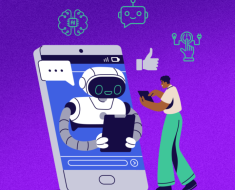
By definition, Artificial General Intelligence (AGI) is a system that can match or surpass human mental skills such as learning, rational thinking and preparing responses. As far as we know, an AGI doesn’t exist today, but progress is being made to attain general intelligence using the new Machine Learning techniques and customized high-performance hardware.
Will we ever attain general intelligence in machine?
Is it possible to build an AGI equivalent to Human capabilities or ever surpass them ? Surely not, because to simulate something (human intelligence in this case), it will require us to first understand and know the original system in entirety and we do not fully understand the depth and capability of human intelligence yet. Recently a term has been coined as Agentic AI, it is a system which is trained on some specific skill and has some goal-oriented autonomy, a more general version of Agentic AI is what we are trying to build in name of AGI.
The current AI architecture is based on the reasoning and math, it may not be able to mimic human properties such as feelings, desires, consciousness, common sense, ethics, intuitions, dedication, motivation etc. These properties enable humans to act appropriately in complex environment and scenarios, manage situations ethically and subjectively. it is debatable that whether or to what degree a machine would be able simulate such human behaviour.
An AI system works with three main components, hardware which consist of (CPU/GPU/TPU/NPU ..) – all to do custom math and formulas, software which mainly consist of a Model (flexible program) with lots of weights and bias (trainable parameters) and the third most important thing is a uniform dataset (feature set) that has some pattern/ correlations/ structure/ information hidden among the data elements. These three components are responsible to given AI an unbiased personality.
The way machine learning models are different from traditional programs is that, instead of programming hard logical conditions. A “Model” program in ML uses multiple layers of artificial neurons that tune parameters and conditions with each pass of input data, and this is what we humans do at least in early age of our lives. Now with enormous compute power and creative programming, a machine learning algorithm analyse given dataset to find the structure of problem in training stage. At this stage algorithms also deduces hidden information, which is not so obvious in the given dataset. More data and innovative training methods will help a model tune its parameters better with the real structure of problem so a model can make better predictions and decisions.
The aim of AGI to mimic/surpass human intelligence, however intellect and intelligence are two different concepts in yogic literature. Intellect is associated with cognitive abilities, and it draws conclusion from past experiences (memory) to calculate decisions rationally. Decisions taken by intellect are objective in nature. However, intelligence on other hand connects us with consciousness and non-physical, non-measurable properties, which may not be compared or explained with logic, hence decision taken by intelligence becomes more subjective, effective, and practical in real world scenarios.
Our current AGI architecture could attain intellect but not Intelligence, as knowing and practicing intelligence require lot more than rational thinking. Intelligence is not something that everyone (a very few people) understands and follows.
The development in AI brings in disruption and new challenges such as Job displacement, partiality (bias), threat to data security, privacy, lack of transparency and responsibility.
Technological unemployment is not new but this time, it has a global and wider impact. The Interpersonal connections are like never before, markets are intertwined, moreover geopolitics, technology advancements, wars, political instability, polarization is all time high.
All these factors add on to the challenges; hence it is important that progress of AI must be closely monitored and governed by regulations. Government must ensure that organizations follow ethical approach and would not take undue advantage of this technology, it is a mutual responsibility of both business and authorities that AI developments will remain user centric rather than profit centric.
While AI itself has issues of training prejudices, transparency, fairness, accountability etc., many companies are abusing AI and automation as cover for violation of business ethics, privacy and copyrights. These business houses are blaming algorithms to hold public money for extended period, making delays in payouts and refunds, delays in dispute resolution, denial of claims and proposals. Customer’s money is being invested in market without declaration and to make undue profit. Activist who are raising voices and concerns against unethical practices are in danger. Governments must establish a mechanism to effectively regulate the usage of AI, also to monitor and investigate any reports of violations and resolve such cases promptly.
Human history has witnessed traditional jobs going away with new technology, but every advancement brings in new opportunities. The way AI is advancing, it is certain that it will replace humans with more efficient machines and processes. However, it is also a decision lies with humans, if they want to get replaced by AI ? as excessive and improper use of Generative AI will kill the creativity and ability. We must understand that upskilling, reskilling, and continuous learning is the only way to survive and thrive, and it is true not just for blue or white collar but even for the gold collar professions.
Opportunities – There are two major opportunities that AI has created for developers and researchers :
1) It has created new Jobs in field of data analysis and development of new algorithms.
Technological unemployment due to AI displacing jobs may have a broader and bigger impact on several profiles, the new jobs that are getting created by AI require good understanding of math and computer science, this indeed is a good opportunity for programmers’ community to learn and implement new data manipulation technique, math and other quality material.
2) Exploring and understanding the scope, limitation and capabilities of current AI models, finding new methods to build and enrich human like AI /AGI experience.
Identifying and overcoming the limitations of present-day AI need lot more than the knowledge of computer science and cognitive skills. It requires philosophical abilities to understand, define and evaluate the capabilities of human mind itself, we must first introspect “if instead of making machines work as human”, have we humans have preferred to become a machine? And why it is so? these philosophical questions like how we could be a better human, what are the hidden aspects and possibilities on human mind, how mind is different from brain, how can we explore and mimic properties that seemed to have eloped in materialistic world? all such questions must be answered to find the true meaning and potential of human intelligence.
Human being function in a way that we use our sensing organs also knowns as “Gyanendriya” (Vedic name), these five sensing organs (ears, eyes, nose, skin, tongue) delivers the “Gyan” (knowledge) what we call “Information” in digital era and passes it to brain. Brain (neural hardware) then processes this information with the help of “Buddhi” (intellect) and transforms it to determine the next course of action, the resulting action is implemented by giving instructions to Karmendriyas (Vedic name), which are again organs that perform karma, such as hands, feet, neck to perform motion, mouth to speak, anus and urethra for excretion.
Vedic science talks about several parts of human mind, where intellect comes from a part “Buddhi” and intelligence from part “Chitta”. The new tools in science such as Quantum Computing has potential to explore the hidden and powerful aspects of human mind, cells, proteins, neuron, and neural links. The quantum tools use bizarre properties like superposition and entanglement to simulate behaviour of fine particles and connections between them. We need to master both scientific and traditional methods to discover self, be it yoga, meditation, healing, stimulation, dhyana, vipassana, philosophical research or some other traditional/non-traditional practice.
To build a true AGI system, first we humans must study and master all aspects of our own mind, and It may seem contrary but development in current AI could help us get there. However if we do not follow right path we may end up creating not human level AGI but something else.
Written by Jayesh Parashar
https://www.linkedin.com/in/jayesh-parashar-7b239b1a/




